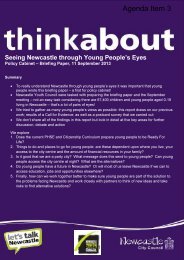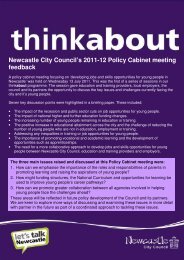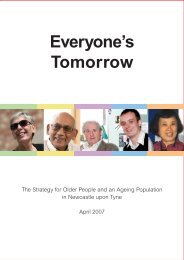NEWCASTLE'S MUSICAL HERITAGE AN INTRODUCTION By ...
NEWCASTLE'S MUSICAL HERITAGE AN INTRODUCTION By ...
NEWCASTLE'S MUSICAL HERITAGE AN INTRODUCTION By ...
You also want an ePaper? Increase the reach of your titles
YUMPU automatically turns print PDFs into web optimized ePapers that Google loves.
men sought Royal Patronage, popular appeal and financial gain by composing<br />
for the stage.<br />
There were possibly as many as one hundred and fifty native composers<br />
active in London in the second half of the 18 th century, many of whom would<br />
have been forgotten today but for one thing and that is they were given the royal<br />
blessing. It was obviously as important then as it is today to be in the right place<br />
at the right time and know the right people if you wanted to ‘get on’, and<br />
musicians were no exception. A snapshot of English musicians from the 16 th<br />
century through to the early 18th century shows that those who achieved a<br />
modicum of success in their day and are remembered still, either sought Royal<br />
Patronage and/or composed in the popular style of the times and gave<br />
themselves and their work maximum exposure in theatres and popular venues<br />
where society gathered. To become a Gentleman of the Chapel Royal or a<br />
Master of the Kings Music seems to have been a sine qua non for lasting<br />
recognition. To be appointed to the Chapel was a great honour and looked upon<br />
as a sign of unusual musical talent. The great days of the Chapel Royal may<br />
have been over by the 1730s but a line of organists continued and the name of<br />
almost every one is well known to the student of English music history today. The<br />
list of composers who have been members is almost a roll of honour of English<br />
music. But for musicians in the provinces life took on a different meaning.<br />
Provincial music making tended to be a specialised concern. Perhaps only two<br />
English musician/composers of the 18 th century managed to remain associated<br />
with one particular locality and make a name for themselves and Charles Avison<br />
was one of them. The other was Avison’s contemporary, Chilcot of Bath, but as<br />
Bath was a Georgian city par excellence, which Queen Anne by her presence did<br />
much to enhance, it makes Avison’s achievement that much more remarkable.<br />
In the 18 th century, Newcastle was still a walled town and it is said that the<br />
town was contained within the walls. They stretched from the riverside to<br />
Gallowgate in the north and from New Bridge Street in the east to Westgate in<br />
the opposite direction and even within this confined space there were generous<br />
areas of parkland. In the early part of the century the town walls were still being<br />
further fortified, its defences did not lose their importance until after the battle of<br />
Culloden in 1746 when a period of comparative peace was established. In spite<br />
of its fortress appearance Newcastle had already established itself as an<br />
important industrial town and was well connected to the rest of the country by<br />
land and better connected by sea than many other sea ports. It was the<br />
discovery of coal in the area that had led to Newcastle’s growth as a town of<br />
industrial importance. This points to Newcastle being, if not one of the biggest,<br />
certainly one of the richest towns in England and well connected with the capital,<br />
yet culturally it remained isolated. Within the confines of its walls the town’s<br />
musical culture was largely contained within and around the leading churches of<br />
St Nicholas, St John and St Andrew, but to mention three of them. Most<br />
provincial musicians/composers were no more than minor church worthies and<br />
those in Newcastle were no exception, which is yet another reason why Avison<br />
17

















